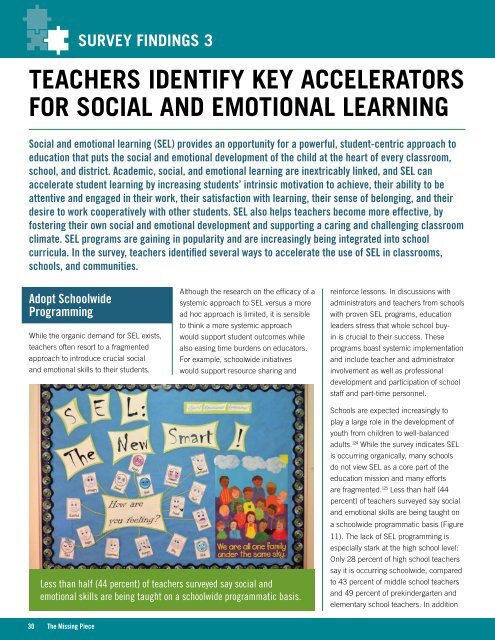the-missing-piece
the-missing-piece
the-missing-piece
Create successful ePaper yourself
Turn your PDF publications into a flip-book with our unique Google optimized e-Paper software.
SURVEY FINDINGS 3TEACHERS IDENTIFY KEY ACCELERATORSFOR SOCIAL AND EMOTIONAL LEARNINGSocial and emotional learning (SEL) provides an opportunity for a powerful, student-centric approach toeducation that puts <strong>the</strong> social and emotional development of <strong>the</strong> child at <strong>the</strong> heart of every classroom,school, and district. Academic, social, and emotional learning are inextricably linked, and SEL canaccelerate student learning by increasing students’ intrinsic motivation to achieve, <strong>the</strong>ir ability to beattentive and engaged in <strong>the</strong>ir work, <strong>the</strong>ir satisfaction with learning, <strong>the</strong>ir sense of belonging, and <strong>the</strong>irdesire to work cooperatively with o<strong>the</strong>r students. SEL also helps teachers become more effective, byfostering <strong>the</strong>ir own social and emotional development and supporting a caring and challenging classroomclimate. SEL programs are gaining in popularity and are increasingly being integrated into schoolcurricula. In <strong>the</strong> survey, teachers identified several ways to accelerate <strong>the</strong> use of SEL in classrooms,schools, and communities.Adopt SchoolwideProgrammingWhile <strong>the</strong> organic demand for SEL exists,teachers often resort to a fragmentedapproach to introduce crucial socialand emotional skills to <strong>the</strong>ir students.Although <strong>the</strong> research on <strong>the</strong> efficacy of asystemic approach to SEL versus a moread hoc approach is limited, it is sensibleto think a more systemic approachwould support student outcomes whilealso easing time burdens on educators.For example, schoolwide initiativeswould support resource sharing andreinforce lessons. In discussions withadministrators and teachers from schoolswith proven SEL programs, educationleaders stress that whole school buyinis crucial to <strong>the</strong>ir success. Theseprograms boast systemic implementationand include teacher and administratorinvolvement as well as professionaldevelopment and participation of schoolstaff and part-time personnel.Less than half (44 percent) of teachers surveyed say social andemotional skills are being taught on a schoolwide programmatic basis.Schools are expected increasingly toplay a large role in <strong>the</strong> development ofyouth from children to well-balancedadults. 124 While <strong>the</strong> survey indicates SELis occurring organically, many schoolsdo not view SEL as a core part of <strong>the</strong>education mission and many effortsare fragmented. 125 Less than half (44percent) of teachers surveyed say socialand emotional skills are being taught ona schoolwide programmatic basis (Figure11). The lack of SEL programming isespecially stark at <strong>the</strong> high school level:Only 28 percent of high school teacherssay it is occurring schoolwide, comparedto 43 percent of middle school teachersand 49 percent of prekindergarten andelementary school teachers. In addition30 The Missing Piece


